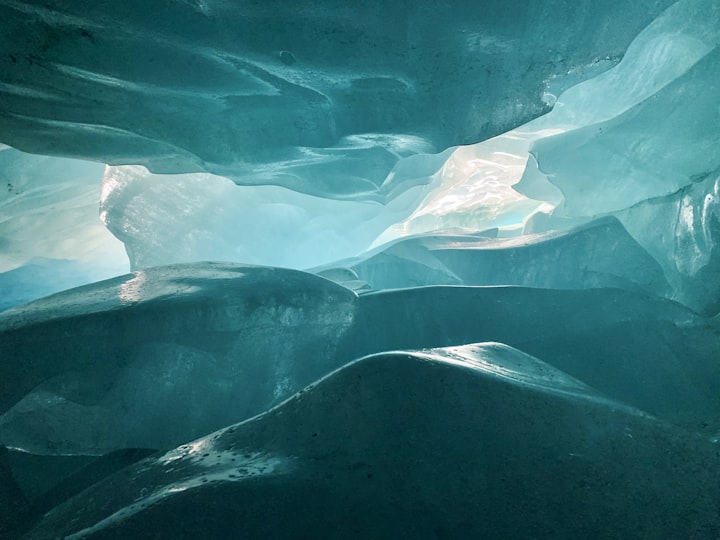
At first he thought she was an ordinary woman. Well, an ordinary dead woman anyways.
Jack had been slowly making his way toward the beach at the end of his street, attempting to compile a record of the damage the ice storm had wrought. It was sunny out but cold, far too cold to write, so he was speaking into his digital recorder as he walked. The damage was stunning — overnight Raven’s Cove had been encased in an inch-thick coating of ice.
Power lines hung so low they nearly touched the ground; others had snapped under the weight. The mostly empty cottages that surrounded his own looked more like elaborate igloos than summer homes, and two dazzling rows of pines lined the road. Heavy, ice-coated branches littered the snow and the air was filled with the intermittent snapping of falling tree limbs.
Except for the steel gray of the sea in the distance, the world was dazzling, as if he had stepped out of reality and emerged into an enchanted land made wholly of green and blue light. Even his sunglasses couldn’t dim the brilliance of the sun hitting the ice. As he took pictures of it all, Jack had to remind himself of the massive damage the storm had done. Because it was all just so beautiful.
He’d reached the end of the street and had carefully made his way onto the rocky shore when he saw her. She was laid out on her side, nude, her entire body coated in ice. Within her glass coffin, her long reddish brown hair cascaded down around her, partially covering her breasts and stomach. Later, he remembered thinking that from a distance, her hair seemed as if it were dimly burning, or more accurately, glowing, like an ember. Later, Jack wondered illogically if it had been her hair that somehow saved her.

Or killed her, depending on how you looked at the situation.
Even with crampons clamped to the bottom of his boots, he had a tough time of it. After a couple of falls, he found himself standing over her pale, still body. He felt mildly surprised that there was no tail, then reprimanded himself for such silliness. It was a woman, for God’s sake, a woman who had somehow gotten caught in the worst ice storm northern Maine had seen in fifty years.
Jack hadn’t brought his cell phone and his knowledge of life-saving was limited to what he saw on television, so for a moment he just stood there uncertainly. Surely she was dead. If she’d been out in the storm long enough for a sheen of ice to form around her then she must be — had to be — dead.
The rational thing
He tried to steady himself, to think rationally about what needed to be done. He was, after all, a man of science. If she were dead it was simply an act of nature, a slight, a very slight, blip on the universe’s cosmic screen. So why did he find himself blinking back tears? Surely it was the sting of the wind.
At that, he had to smile. As a man of science the least he could do was to seek out honesty — if not in the world, his personal life — then at least in himself. This dead woman on the beach with her stillness and her translucent skin and her wood-fire hair hurt him in some odd, indelible way.
The rational thing would be to leave the body undisturbed, return to his cottage and phone the police. No matter if the police had more pressing things they had to contend with. No matter if it would be hours, if not days, before they were finally able to get her frozen corpse off the beach. Their business for the immediate future had to be with the living, he thought, then forced the realization out of his mind. What did it matter if the police were delayed? She was dead. There was nothing he or the police could do to change that.
Yes, he thought, feeling satisfied. Calling the police was exactly what he would do. He turned toward the direction he had come from and began the slow journey back.
He heard a cracking noise. Like ice breaking.
He stopped. Didn’t look. At that moment he was the most terrified marine biologist on the planet.
There was a slight, a very slight, tinkling noise. Ice skittering across ice.
Jack forced himself to turn, despite the pounding in his chest. What had been a perfect glass coffin only a moment before was now webbed with a thousand tiny lines. It reminded him of the time a boy had hurled a rock into his windshield, the way the lines kept spreading, multiplying.
Rushing toward the woman, he knelt and touched both hands to the ice. It was nearly, but not quite, warm. He removed his gloves and worked a finger into one of the cracks, trying to pry it loose. After a minute or so, it gave. After that it was a simple matter, to free her from the ice. When he finished he touched his fingers to her neck, searching for a pulse.
She opened her eyes then. They were green as the sea at the heart of the Caribbean.
“Are you all right?” he asked her, cradling his arm around her and raising her to a sitting position. “Are you hurt?”
She shook him off and stood up with some difficulty. “Where’s my skin?” she asked, shielding her eyes against the blare of the sun.
“Your skin?” he repeated, wondering if there were some other meaning to the word. Or maybe there was brain damage. That would make sense. Anyway, aside from what must have been the world’s record for frozen seaweed, there was nothing else among the detritus that stood out. Certainly not anything resembling someone’s skin.
Trust issues
Before he had time to form another question, she grabbed him by the collar of his parka and shook him. “If you took it you’ll regret it,” she said accusingly.
“I don’t know what you’re talking about,” he said, adding stupidly, “I’m a biologist.”
“All the more reason for you to take it.”
“You’ve been through a lot,” he said, gently removing her fingers from his parka, talking slowly and softly, the same way he talked to his mother when he visited her at the assisted-living facility in Bangor. “There’s been a storm — “
She laughed in his face. “Thanks for the newsflash.”
As an associate professor at the University of Maine, a respected author of two books on invasive colonial ascidians, and a summa cum laude graduate of Harvard, Nicholas Durham was not used to being laughed at.
“Listen,” he said, “I don’t know who you are, but all I was doing was trying to offer some assistance. I’m the one who discovered you. I’m one who extricated you from the ice. Now I don’t expect you to marry me out of gratitude — I don’t even expect you to thank me. But I would appreciate it if you would please refrain from making gratuitous accusations.”
Even to Jack, it sounded ridiculous. One of his worst faults was falling into high diction when he felt threatened. Sophisticated words always made him feel superior and safe.
“I’m sorry,” she said after a pause. “I’ve got trust issues.”
“Thanks for the newsflash.”
“Men have taken my skin before.” She amended, “Well, actually just one. He stole it.”
He tried to form a sentence, found his impressive vocabulary had deserted him entirely.
“In 1944.” To her credit, she really did seem as if she were making an effort with him.
“I see,” he managed.
“You think I’m crazy.”
“No,” very slowly and softly. “Not at all.”
“I’ve got to find my sealskin,” she said, using precisely the same tone with him. “It must have come off in the storm.”
He’d never heard such controlled urgency before. You would think she’d be relieved just to be alive. She wasn’t young, exactly, but then again she didn’t look altogether old. There were small wrinkles around her eyes and at the corners of her mouth. Thirtyish? Though it was hard to tell anymore, what with special skin creams and Botox and God only knew what else.
Against his better judgment, Jack felt himself scanning the rocks for something that might resemble the dark slick coat of a beached seal. He supposed it was possible that one of the ice-coated rocks might just be something like that.
Do you have any family?
He squinted toward a jetty of boulders, then stopped himself, appalled at the outlandishness of the situation. “Do you have any family? Anyone you can call?”
“They’re probably long gone by now,” she said, taking a step then slipping and nearly losing her balance. “I was late as it was. It would have been too dangerous for the pod to wait any longer.”
That was when he noticed she was shaking. However crazy and annoying she might be, she was still a human being who’d been through something terribly traumatic.
Still, he wavered. He’d never been one to act impulsively. His life had been built with the cement blocks of hard work and measured progress, so when success came it surprised no one, especially not him. The only flaw in the edifice had been the departure of his wife the previous year. He barely noticed she was gone but the lack of a partner embarrassed him slightly. In spite of himself, he hated appearing at social gatherings minus a wedding ring and having to answer probing questions at parties. He didn’t mind the solitude at all, but despised the vulnerability his role as jilted lover forced upon him. How would it play, in Raven’s Cove or — even worse — at the university, when news got out that he had rescued some kind of schizophrenic nudist?
“Can I take you to my home?” Jack heard himself ask. “You’ll make yourself ill if you stay out here any longer like that.” And at 42 years of age, he blushed.
She looked truly distraught. “Can we come back later and look for the skin?”
“Yes,” he promised, belatedly thinking to remove his parka and drape it around her shoulders. “Of course.”
Photo by Joanna Nix-Walkup on Unsplash
No point in arguing with her about the fantasy now. Better to attempt some form of reality check when she was no longer in danger of hypothermia. He wondered how long it would be appropriate to wait before phoning someone from the state’s mental health department. “You’d better put that parka on,” he told her.
She complied, but left the jacket unzipped, as if she couldn’t be bothered with such details.
“Uh, maybe you should zip that,” he suggested awkwardly.
She glanced down, then fastened the ends of the zipper together. As she pulled it up, she gave him a cynical smile that was icier than any single thing in that world of glass. “Until we get home, you mean?”
For the rest of his life, he went back to that moment whenever he was at his lowest. Had she read him better than he’d read himself? She couldn’t have. Sex — romance—love — simply had not been in his mind that day. As soon as he realized she wasn’t dead he hadn’t felt anything in particular for her, not even pity.
Had she been a real seal — an entity he could study and integrate into his kingdom of expertise — he would have been more interested. At least that’s what he thought to himself that first day after the storm. Occasionally, in later years, if he indulged in a shot of bourbon or two, he allowed himself to consider her feelings for him. Certainly, her remark hadn’t been any type of suggestion — any form of provocation — on her part.
Nothing that ever came afterward gave evidence of that.
About the Creator
Lori Lamothe
Poet, Writer, Mom. Owner of two rescue huskies. Former baker who writes on books, true crime, culture and fiction.






Comments
There are no comments for this story
Be the first to respond and start the conversation.